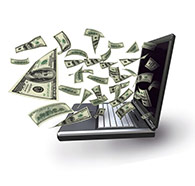НАВИГАЦИЯПОПУЛЯРНЫЕ СТАТЬИ
|
Making matters worse, profits in any industry related to oil are down so far that it appears its current recession may last as long as two years. 30.12.2015 18:45 These 5 Trends Will Shape the Global Economy in 2016 Every year brings its share of economic events that take us by surprise. Few people predicted the collapse in oil prices that started in the summer of 2014, or were able to time the sharp decline in economic growth in China that started a few months ago. That said, many of the economic trends that shape our world can be spotted ahead of time by careful observers. For instance, many pundits argued that the Federal Reserve wouldn’t be able to raise rates this year, but a close examination of the data would have enabled you to predict the Fed’s December liftoff. In 2016, new economic trends will emerge or gain steam, and shape the world we live in for the better or worse. Here are the top five: 1. The Global Economy Will Continue to Be Powered by America. 2. China Will Stay Stuck in Second Gear. 3. Commodities Will Be Cheap. 4. Europe will edge closer to crisis. 5. India will become the new growth king. 29.12.2015 14:39 No pick-up in world economy in 2016 The world economy may be set for another year like 2015, with modest growth in developed economies offsetting persistent weakness elsewhere but generating very little inflation and keeping interest rates low. The US Federal Reserve`s long-awaited rise in rates from zero showed confidence in the world`s largest economy, but rival China is still struggling for a foothold with rate cuts. Although some countries, such as Brazil, have mainly home-grown inflation troubles, the Fed`s first post-crisis rate increase is an unlikely cure for what ails the rest of the world. With exchange rates dominating the policy debate in many countries, what happens to the dollar will matter a lot. “The key question is whether the US economy is finally robust enough not only to sustain its own recovery but also to lift world trade and global growth enough to allow the external deflationary pressures weighing on US inflation to wane,” outlined HSBC economists Janet Henry and James Pomeroy. 28.12.2015 12:52 Russia has not yet passed the peak of its economic problems Russia`s economy contracted in November after a short-lived recovery, the Economy Ministry said Monday. Russia`s gross domestic product fell 4% on the year in November, taking the annual decline for the January-November period to 3.7%. In monthly seasonally adjusted terms, GDP shrank 0.3% in November after growing 0.1% in October. The data contrasts with comments by government officials and President Vladimir Putin that the economy had bottomed out. The government expects GDP to shrink by up to 3.8% for full-year 2015. Given a recent drop in oil prices, Russia`s economy is likely to contract further in 2016, the central bank said earlier this month. Alexei Kudrin, head of the Civil Initiatives Committee and former finance minister, said he believes Russia has not yet passed the peak of its economic problems. "Some time ago, many experts, myself included, believed that we had reached the bottom, or, like they say, had passed the peak of the crisis. But today we see some worsening, which November is already demonstrating to us," Kudrin said in an interview with Interfax. He said "this means that the situation is currently unstable." 25.12.2015 17:52 Can Russia`s Economy Recover in 2016? A year ago it seemed that the Russian economy was in free-fall. One rating agency, when downgrading Russian credit early last January, cited a significant deterioration in the economic outlook, the continued impact of western sanctions, plunging oil prices, shocks to the banking sector (from the ruble depreciation, market volatility and drastic hikes in policy rates) as some of the main reasons. The turmoil in Russian markets toward the end of last year came on top of a period where most of the main macro-economic indicators were already a source of growing concern. As the International Monetary Fund noted last summer, Russia already entered 2014 with declining potential growth owing to the stabilization of oil prices, stalled structural reforms, weak investment, declining total factor productivity and adverse population dynamics. In addition, the ongoing slowdown was exacerbated by the dual external shocks from the sharp decline in oil prices and sanctions. With Chinese demand withering and US shale producers coming on stream, OPEC became increasingly an irrelevant sideshow. In these circumstances, the seemingly irreversible softening in oil prices led to severe pressure on the ruble, a surge in inflation, market turbulence, and concerns over financial stability. In response, the authorities accelerated their long-anticipated move to a floating exchange rate in November 2014, thus protecting both the budget and foreign exchange reserves. As the ruble dropped, inflation accelerated and hit double digits on an annual basis starting in December 2014. But what about next year? Many observers consider that the economic situation will continue to unravel. 24.12.2015 16:20 Global Economy to More than Double by 2040 The global economy will grow an average of 3.5 percent per year and will be more than double its current size by 2040, OPEC said in its World Oil Outlook report released on Wednesday. "Driven by demographic and productivity trends, world Gross Domestic Product (GDP) growth is estimated to average 3.5% [per annum] for the period 2014–2040. As a result, the world economy in 2040 will be 244% of that in 2014. Developing countries will account for three-quarters of the growth averaging 4.6% p. a. for the forecast period. China and India alone will account for half of this growth," the report reads. Though China`s gross domestic product will grow 120 percent in the next 25 years, the per capita GDP throughout the world will not change dramatically, OPEC said. "Contrary to a ranking of regions based on GDP size, the ranking on a per capita basis will not change dramatically. OECD America will continue to have the highest GDP per capita of all regions followed by OECD Asia Oceania and OECD Europe. As income per head in China and India will almost triple, these countries will move up in the rankings. However, the figures also underscore the unequal distribution of wealth in the world. While in 2014 the ratio between income per capita in the poorest region (Middle East & Africa) and the richest region (OECD America) was 9.8, in 2040 it is expected to increase to 11.5," the report reads. 23.12.2015 20:33 How much are Western sanctions hurting Russia`s economy? Sanctions imposed by Western nations on Russia over its involvement in the Ukraine crisis and absorption of Crimea have hurt the country`s economy, but not mortally wounded it. The collapse of oil prices and the subsequent devaluation of the ruble have done far more damage. But faced with this double whammy, the Kremlin is in crisis mode and trying to stitch together a rescue package. In the long run, the current squeeze may end up being a boon for Russian companies, as firms used to easy profits have been forced to cut costs and improve really bad management practices. The sanctions imposed last year were largely symbolic, with the notable exceptions of the ban on offering Russian companies anything more than 30 days` credits, and the list barring Western firms from doing business with some of the largest corporate and financial institutions in the country. As a result, the banking sector is bearing most of the brunt of the move. “In the old days, our business was easy,” said one senior banker who didn`t want to named. “We borrowed long, cheap money from the international markets and lent it short and expensive on the domestic market.” 22.12.2015 14:55 Is Russia still a key world power? Whether Russia, one of 15 successor states to the USSR, which broke up in 1991, is still a genuine world power in 2015 is open to question. It remains the world`s largest country and the largest oil producer. It retains its permanent seat on the UN Security Council (one among five). Its nuclear arsenal (in Cold War times one of five countries, but now one of nine) has been progressively modernized. Sustained increases in defense spending have brought it close to its goal of escalation dominance in local and regional war. But the economic base for these capabilities is steadily declining. Russia`s economy is the 10th largest in the world, producing little of value beyond hydrocarbons. Corruption and rent-seeking extract an enormous economic toll. It remains burdened with Soviet era infrastructure, and its ability to meet the educational and medical needs of its population is rapidly declining. 21.12.2015 14:32 The World Bank updated its economic outlook for Russia for 2015-2017 The World Bank has updated its economic outlook for Russia for 2015-2017 to reflect a recent downward adjustment in oil prices. The new most likely scenario assumes an average oil price of US$51.9 per barrel for 2015 and of US$49.4 per barrel for 2016 from previously projected US$53.0 per barrel in 2015 and 2016. The assumed lower oil prices are expected to have no impact on growth in the last quarter of 2015. On this basis, the World Bank keeps its 2015 projections of a 3.8 percent real GDP contraction by this year. Growth for 2016 was revised slightly down to -0.7 percent (from -0.6 percent). “The revised forecast is largely driven by the recent downward adjustment in oil prices that is expected to keep pressure on the ruble exchange rate, somewhat delaying the retreat of inflation in 2016,” said Birgit Hansl, World Bank Lead Economist for the Russian Federation. “Elevated inflation risk could further delay the Central Bank of Russia from resuming its monetary easing cycle. Higher borrowing costs than anticipated in the previous forecast could then limit credits to firms and households.” 18.12.2015 21:14 What awaits Russia`s economy in 2016 - collapse or recovery? The collapse of oil prices in December has divided officials and analysts into pessimists and optimists, with Russian Finance Minister Anton Siluanov predicting on Dec. 12 that the price of oil in 2016 will fall below $30 per barrel in some periods, according to the TASS news agency. According to Siluanov, demand and the price of oil will continue to decline over the next year and Russia needs to start preparing for the worst. “We need to draw up backup plans now – on what would happen if the prices will fall further,” said Siluanov, recalling that the 2016 budget is based on a price of $50 per barrel, while the macroeconomic situation is currently showing no signs of changing for the better. An oil price of below $40 is considered a risk scenario in the government`s macroeconomic development plan for 2016. In this case, the economy will lose another 2-3 percent, the investment slowdown will continue, and inflation will fall to 7 percent by the end of 2016. According to Central Bank head Elvira Nabiullina, “the relevance of this scenario has recently increased.” |
Цитата дняБольшинство людей начинают интересоваться акциями, когда все остальные интересуются. Время интересоваться — это когда никто другой не интересуется. Вы не можете купить что-либо популярное и выиграть от этого. |




 31.12.2015 15:29 Oil Crash Shrinks Russian GDP; Energy Minister Blames Saudis Russia`s oil-dependent economy appears headed for a second year of recession, and Energy Minister Alexander Novak says the blame falls squarely on the Saudis. The Russian gross domestic product fell by 4 percent in November from its level in the same month in 2014, and had shrunk 3.7 percent in October from its levels a year earlier, the Economy Ministry reported Monday. The reason, to no one`s surprise, is the plunge in oil prices over the past 18 months. The global average value of a barrel of oil has crashed from over $110 per barrel in the summer of 2014 to just below $40 per barrel today. Because Russia`s government relies on oil production for half its revenues, it`s preparing for a 3 percent deficit in the budget for the coming 2016 fiscal year.
31.12.2015 15:29 Oil Crash Shrinks Russian GDP; Energy Minister Blames Saudis Russia`s oil-dependent economy appears headed for a second year of recession, and Energy Minister Alexander Novak says the blame falls squarely on the Saudis. The Russian gross domestic product fell by 4 percent in November from its level in the same month in 2014, and had shrunk 3.7 percent in October from its levels a year earlier, the Economy Ministry reported Monday. The reason, to no one`s surprise, is the plunge in oil prices over the past 18 months. The global average value of a barrel of oil has crashed from over $110 per barrel in the summer of 2014 to just below $40 per barrel today. Because Russia`s government relies on oil production for half its revenues, it`s preparing for a 3 percent deficit in the budget for the coming 2016 fiscal year. Автор:
Автор: 
 Комментарии: 0
Комментарии: 0 Просмотров: 24
Просмотров: 24


